Guest Notes For Drive On Recording
I appreciate your willingness to share your thoughts and experiences on the Drive On.
This page will cover what you will need to know when we record your interview.
Recording
You should receive an email with the link to access the recording from SquadCast ([email protected]). Check your spam folder if you don't see the email. You will not need to download any software other than a web browser (i.e., Google Chrome) to access the internet.
Tips For Remote Recording Guests
Microphone
Audio is probably the most critical aspect of the recording to get right. If the video isn't perfect, the viewers can look past that. However, they'll likely tune out if they can't understand what you're saying.
It is best to use an external microphone if you have one. The built-in microphone on most computers tends not to have the best sound quality.
If you have headphones with a built-in microphone, like the headphones that might have come with your cell phone, you can plug that into your computer, and it'll work better than the built-in microphone.
Airpods or other Bluetooth headphones with a built-in microphone are great too. But you don't need to go out and spend hundreds of dollars on an expensive microphone. Something inexpensive like this will work.
Headphones
Wearing headphones while we record will reduce the "echo" effect when my voice exits your computer speakers and enters your microphone. We can't do much about that when editing the audio, so it's best to eliminate it by using headphones. Again, if you already have headphones, you can hook up to your computer, those should work fine.
Recording Environment
Keep the room quiet where you are recording. Dogs barking, kids being kids, fans, air conditioners, and the garbage truck outside your window will all creep into the recording. Again, the audio quality will suffer if you have any background noise, so try to reduce it as much as possible before we start recording.
If you know that garbage day or your landscapers come on a specific day of the week, try to avoid scheduling the recording on that day. (You can always reschedule for another day if you've already scheduled).
Video Equipment
The video will be recorded as part of the TV broadcast. Short clips may also get shared on social media sites as well.
You can use just about any camera type that connects to your computer. Many computers have built-in webcams, which will work but may not be the best quality. You can also use a USB plug-in-type camera or any number of other devices when using your computer.
If you use your cell phone, the built-in front-facing camera (the one on your screen) will work. Just make sure that the phone is positioned in landscape mode.
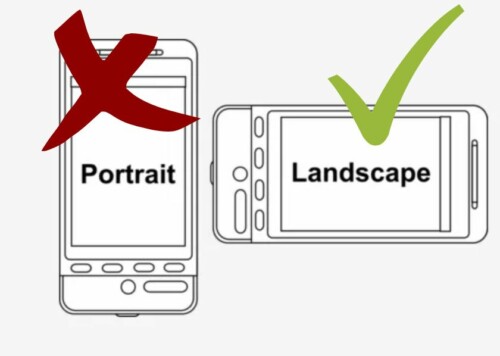
Lighting
Try to situate yourself in an area with good lighting.
The best lighting will have a light in front of you, either behind or next to the camera, and another light behind you, but not in view of the camera.
If you don't have access to a well-lit space, you can place a lamp in front of you to improve the lighting. If there are windows behind you, those will wash out your face on the recording. Move so the window is not behind you, or close the shades so the light doesn't come in.
Dress/Appearance
I don't particularly care how you dress or whether or not you have a messy room in the background. However, the episode may be seen/heard by people that you want to take you seriously. So, it may be best to neaten up a bit.
Camera Positioning
When positioning yourself at the camera, keep these tips in mind:
- Don't be so close to the camera that your face is the only thing on the screen.
- Don't be so far away from the camera that we're distracted by everything else on the screen.
- Ensure the lighting (or lack thereof) doesn't make your face too dark.
- Orient the camera so your face is towards the center of the screen. We will have a banner across the bottom of the screen, and we don't want to cut your face off.
-
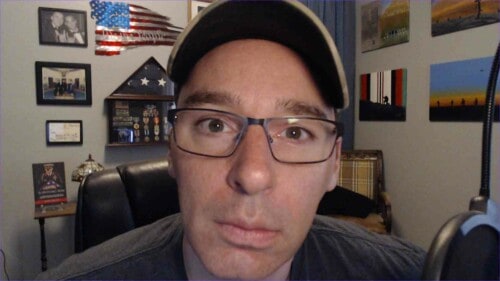
- Too close ❌
-
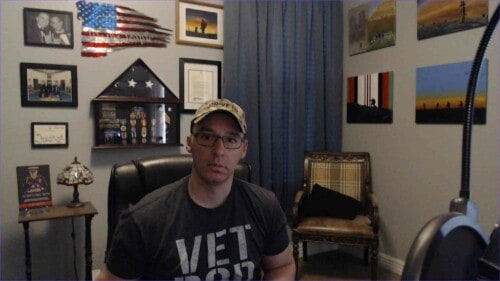
- Too far ❌
-
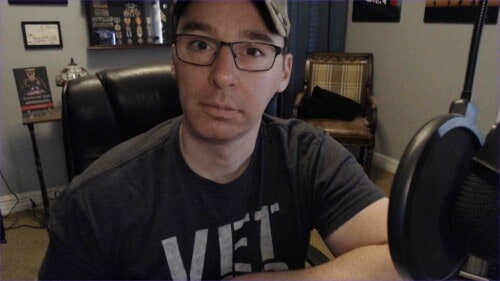
- Too high ❌
-
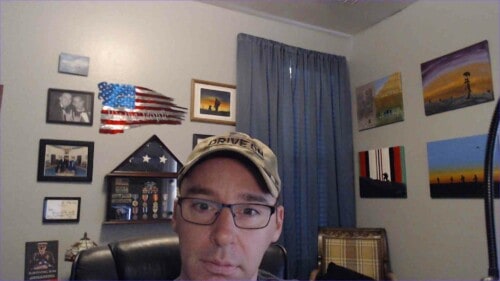
- Too low ❌
-
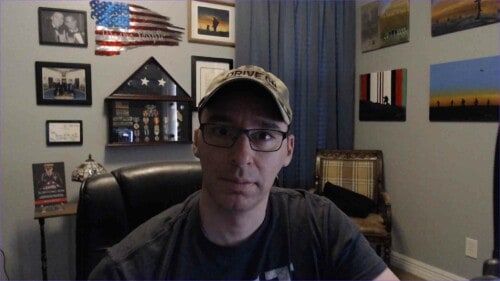
- Too dark ❌
-
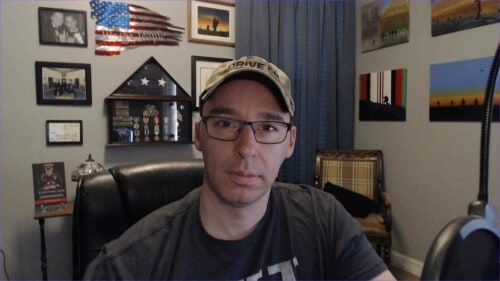
- Just right ✅
WiFi has become so prevalent that we hardly ever think of the days when wired connections were required to access the internet.
However, a wired ethernet connection will provide the best reliability when recording remotely. The recording software uses a lot of bandwidth and may not get the best results on WiFi.
Please see this helpful guide for help connecting your computer with a wired ethernet connection. Note: If your computer doesn't have an Ethernet port, you may need to use a USB-to-Ethernet connector with your ethernet cable, which you can get relatively inexpensively at Walmart, Best Buy, Amazon, or other local electronics stores.
The recording software recommends a minimum of 10 Mbps upload and download speeds for the best experience. Higher speeds are better, though. You can test your internet speed by clicking here.
If WiFi is all you can access, it may still work, but we have an increased risk of the connection being dropped. This has happened several times with guests using WiFi, so it is highly recommended that you use a wired connection.
We don't recommend connecting to SquadCast using a VPN, Enterprise, Shared, Government, College, Bank & or Medical networks/computer/devices.
Tips for improving the connection during the recording:
- Keeping SquadCast as the focused tab in your browser because the background tab's connectivity can be throttled
- Toggling Hide Incoming Video to stop incoming video streams from other participants
- Reconnecting from an Incognito tab (press CTRL/CMD + Shift + N) as a quick way to disable browser extensions, because they can throttle connectivity
- Restarting the computer & resetting the WiFi router can help to stabilize the connection
- Asking other people on the network to disconnect prioritizes your connection - if other people in your house are watching Netflix, there will be less bandwidth for you to use during the recording
- Plugging into ethernet instead of WiFi reduces latency & can help to stabilize the connection
- Running a network speed test will help shed light on your network status
- Contacting your Internet Service Provider (ISP) to inspect your network status
The SquadCast recording software has a "Green Room" that you will enter before joining the recording session.
This Green Room allows you to make sure you have the correct camera, microphone, and headphones selected. You can see and hear yourself to test how you look and sound. If you don't like something you see or hear, now is the time to change it.
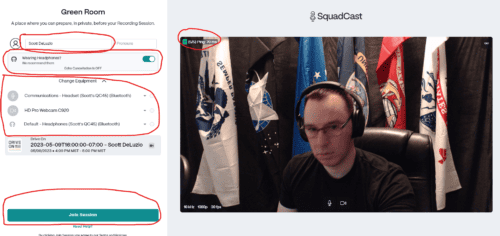
In the screenshot above, there are five highlighted areas:
- Name: Enter your name here. This will help me identify your recording after we finish the interview.
- If you are wearing headphones, toggle the switch so that the white circle is to the right and the oval shape is filled in green. If you are not wearing headphones, toggle the switch so that the white circle is to the left and the oval shape is greyed out.

Wearing Headphones

Not Wearing Headphones
- Click the "Change Equipment" dropdown to expand your options to change your headphones, microphone, and camera. You'll see yourself on the right, so you should be able to tell if you're using the correct camera.
- At the top left corner of the video, you'll see a red, yellow, or green icon, depending on the strength of your internet connection. Ideally, we want it to be green. However, yellow could work, but there is an increased chance that our connection will drop. Red will most likely cause us to have dropped connections in the conversation.
- The Join Session button is at the bottom. Once you're happy with your look and sound, click the Join Session button and enter the recording.
For more information on using SquadCast as a guest, please click here: https://squadcast.fm/guest/
Photo & B-Roll
When your episode goes live, we'll publish it on social media. When we do, it's nice to have a photo of you to go along with it. A headshot or a candid shot of you doing something we will discuss would be great.
Here's an example of what we're looking for.
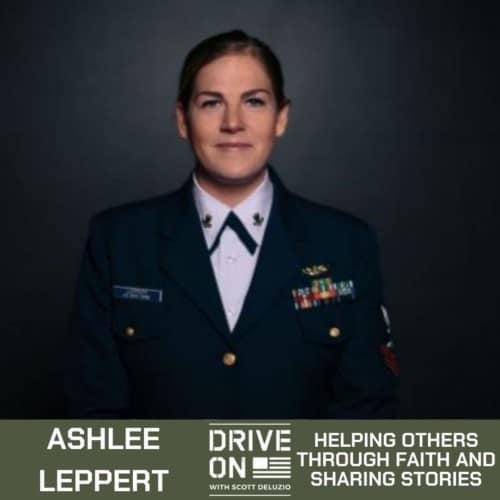
According to Wikipedia, B-Roll "is supplemental or alternative footage intercut with the main shot."
What does this mean?
We may cut away from the main interview to show related content when airing the episode on television. For example, if you're describing your military service, we could cut away to several photos or videos of you in uniform.
These photos or videos show the audience the story's context and are sometimes more interesting to watch than two people talking. These secondary images are often presented without sound or with very low-level sound, as the sound from the primary footage (our interview) will continue. At the same time, the other pictures or videos are shown.
Think about when you are watching the news. You may see a segment talking about a local non-profit putting together care packages for the troops. While the news reporter is interviewing the guest, they may cut away to some photos or videos of people putting together those care packages. That's the type of content we're looking for here.
Where can I get B-Roll content?
For veterans/service members: If you have photos or videos from your time in the military, those will work well. We'll likely talk a little about your service, and those will work great.
For service providers/non-profits: If you have footage from a program you run or an event you've hosted, that would be great.
For civilians/supporters/others: Perhaps we're talking about a loved one who served in the military. Photos or videos of them would be great. If you do something special to support the military (i.e., a motorcycle ride across the country, run a marathon while carrying an American flag, etc.), photos or videos of you doing those things would be great.
Whatever you have, send it over. If we can use it, we will. If it doesn't work for whatever reason, it isn't a big deal.
Format
I'll start with a quick introduction of who you are and what you do, then I'll turn it over to you to properly introduce yourself.
You should have the mindset that everything that is heard or seen after you enter the recording space will end up on the final edit. Put your dog in another room, get your glass of water, adjust the camera and lighting, and do anything else you need to do before you sit down to record.
There is a staging area before you get to the interview room for a reason. This lets you select the correct camera and microphone and make sure you look and sound good before you get to the interview room.
The actual time we will record will vary depending on how much you have to say about the subject. Episodes are, on average, 45 minutes long. I try not to have any that are shorter than 30 minutes since they don't offer quite as much value. I'm also not Joe Rogan, so I'm not going to do a 5-hour marathon episode either.
Please try to arrive approximately 5 minutes early so we can make sure the sound and video are working properly.
I like to talk about your time in the military. We all have stories from when we were in the military, and it's nice to share something from that time. It could be about something that happened on deployment, a life-changing lesson you learned, or even a funny, relatable story. Sharing your struggles and triumphs are great ways to give hope to others who might be going through the same situation.
The transition from military to civilian can be difficult. Sharing your experience can help others who might be struggling with the transition. We can also talk about your time after getting out of the military if you aren't still serving.
We will only discuss what you are comfortable discussing. Please let me know beforehand if any topics are off-limits to you. We record "live-to-tape," meaning that we pre-record the episodes, but we record them as if they were a live broadcast, so there won't be any time to stop and edit parts of the conversation. It's important that I know about any "off-limit" topics prior to when we record.
I want to talk about the service you provide or your support to veterans and the military community. A large part of this episode will be to raise awareness of you, your cause, or your organization. The service you offer might be able to help veterans who may not have heard about it before.
We all know about the VA and the services that they offer. I want to ensure that veterans who listen to the show learn about the other support and services available from other sources. That's where you come in.
I've used the following format with non-profits in the past. It is a loose guideline - we can stray from this if the conversation warrants it. However, I've found that it is sometimes helpful for the guest to have a rough idea of what I'm looking for:
- A brief background on the guest (military service if applicable, how they got involved in the non-profit, and anything else they'd like to add).
- Talk in general about what the non-profit's mission is and how it helps the veteran community.
- Overview of specific programs the non-profit provides.
- Anonymized success stories - I don't want to violate the privacy of anyone who has benefitted from the non-profit. But, if you could share a few stories of how people have benefitted from your work it may help the listeners identify with those people and be more willing to reach out for help.
- Discuss how people can reach out for assistance through the non-profit.
- Let listeners who wish to donate or volunteer know how they can get involved.
- Closing thoughts, and reiterate where listeners can go to get involved (website, social media, etc.)
This show aims to provide helpful information to other vets who might be struggling after getting out of the military. With that in mind, I want listeners to hear your message of hope. If you were a veteran, let's talk about some of the struggles you went through so that they know that they're not alone. If you provide a service to veterans, let's talk about that service to let them know that there are other options than talk therapy or pharmaceuticals.
If you have any specific topics you want to discuss, please let me know beforehand so I can be sure to include them in the conversation.
Promotional Materials
If you or your company have physical items you would like to send to Scott before the recording, such as a copy of your book, apparel, or other things you can send them to:
Drive On Podcast
13954 W Waddell Rd
Unit 103 Box 201
Surprise, AZ 85379
Note: This is only a mailing address at a UPS Store. Do not show up to this address unless you have a package to send out. I will send you the physical address separately if we are recording in person.
Ground Rules
My goal is to provide helpful content to listeners of the show. There are a few things I expect of the guests. Please see the topics below, and let me know beforehand if you have a problem with any of these.
No politics. I have my political beliefs, and I'm sure you have yours. I'm glad that you do. However, the goal of the show is to support veterans, period. I don't want to alienate a group of veterans because of someone's political views.
That doesn't mean that we can't talk about a bill in Congress that affects veterans or service members. However, I don't want to have guests bashing one side or the other during the discussion, regardless of their beliefs.
- ✅OK: Bill number 8675309 is in front of the House of Representatives, and it will help veterans who are affected by burn pits. I would encourage the listeners to contact their representatives to support this bill.
- ❌Not OK: Bill number 8675309 is in front of the House of Representatives, and it will help veterans who are affected by burn pits. It's probably not going to pass, though, because the jackass [Democrats | Republicans | Martians] added some B.S. language to the bill that advances XYZ agenda. Man, I really hate those [Democrats | Republicans | Martians].
I don't want listeners trying something they heard about on this show that will land them in jail. That tends to make matters worse.
However, I do recognize that certain things that are illegal in the United States might not be illegal in other parts of the world. You may have had an experience where you traveled to a country in South America and found a benefit in something you tried along the way. That's a part of your story, and it is worth telling.
You may have even done something illegal here at home. That's also part of your story, and you shouldn't feel like you have to censor yourself.
But please, make sure to preface your comments with something along the lines of "I'm not a lawyer, but I don't believe this is legal in the United States. When I traveled to South America, I was able to legally experience this. If you want to try this too, you should also consult with your doctor to make sure you can handle it."
The interview will undergo only minor editing. Typically this includes things like cutting out parts of the interview that didn't sound right. This may be due to tech issues, or perhaps someone fumbled their words and rephrased what they were trying to say in a better way. Those are usually pretty easy edits, which I don't mind doing, but I won't make them unless they're absolutely necessary.
However, I'm not going to re-record whole parts of the episode. Please take time to rehearse what you want to say. I've found that practicing in the mirror helps because you can see the facial expressions and other mannerisms that you may not otherwise know you were doing. It gives you an idea of how you'll look when we record.
You need to come prepared. Editing isn't a substitute for being prepared.
I will decide if and when the interview will be published. Please let me know if you have a particular date that would make sense for the episode to be released (book launch, event date, etc.). We will try to accommodate your request if possible, but I don't make any guarantees.
Please be on time. Actually, please show up at least 5 minutes before our scheduled time to make sure we iron out any audio or video issues.
I understand that other things come up, so please reschedule for another time at least a day in advance if you can't make it.
There is a reschedule link in the confirmation email you received, which you can use to find a new time. Or, email me to let me know you can't make it.
I will wait no longer than 10 minutes after our scheduled time to begin recording. Occasionally I'll have back-to-back meetings, so I can't wait longer than that. Same deal as the military - be on time.
If you miss the scheduled recording time without rescheduling or letting me know you can't make it, I will only reschedule again with you at my discretion. Probably not, though.
I do not pay guests to appear on the show. Don't ask. My response will be to cancel the interview if you do. The deal is that you get access to my audience to talk about your cause, brand, book, or whatever. I get the content we produce to help grow the show. Fair enough?
The content we produce may be used for any purpose. It will get put out in audio and video formats. The text will also get put out in the form of a transcript. Video/audio/text segments may also be used in social media posts. These are only examples of how the content may be used and is not an all-inclusive list.
You will be provided with a few graphics that you can use to promote the article on your social media accounts, website, or wherever else you'd like to promote it. If you'd like to use anything else from the episode, please let me know, and we'll see what we can do.
Relax
We're just having a conversation. There is nothing to get nervous about. Don't worry. Relax, and enjoy telling your story!
